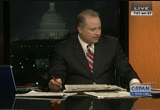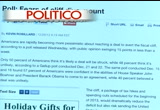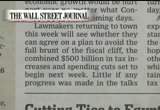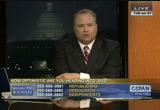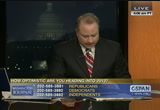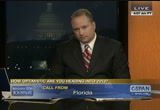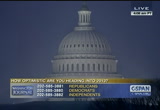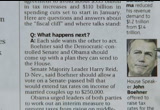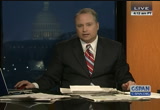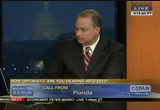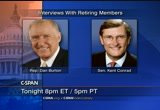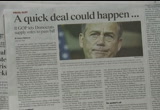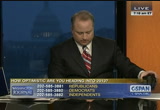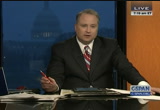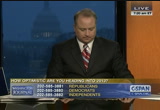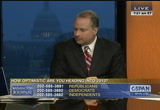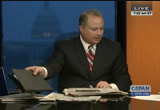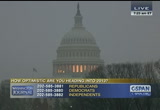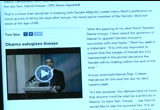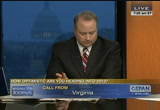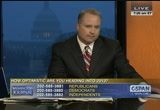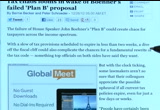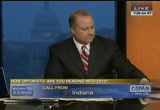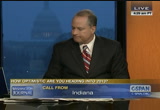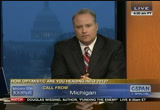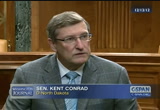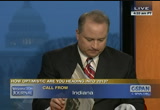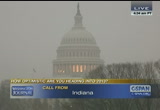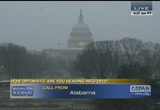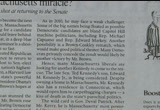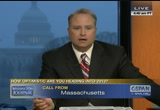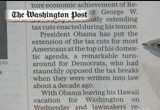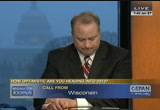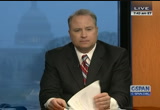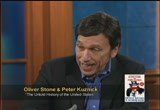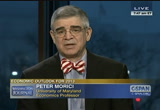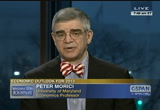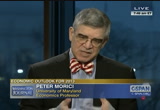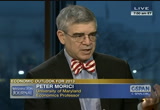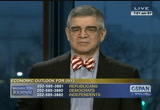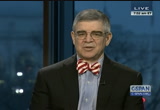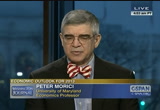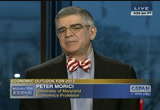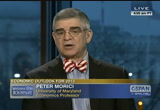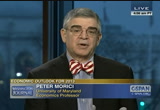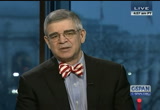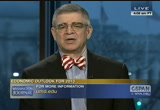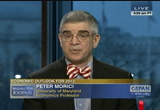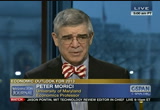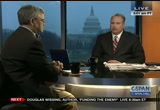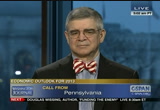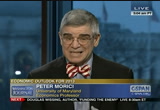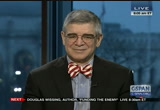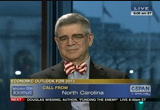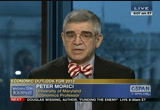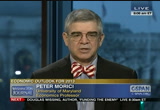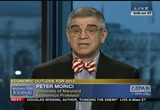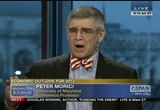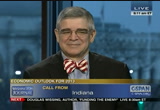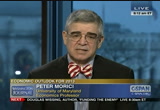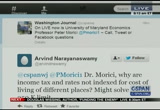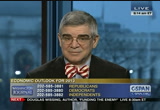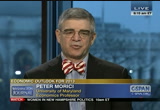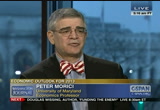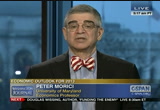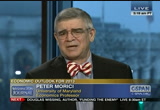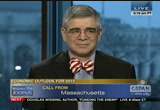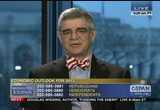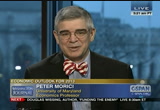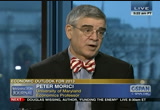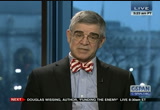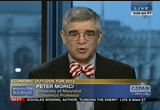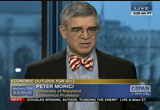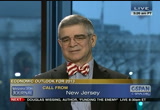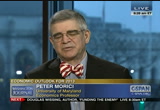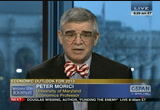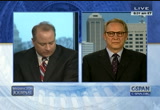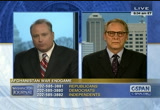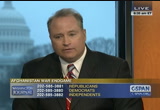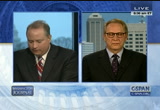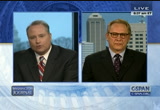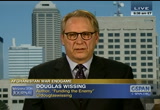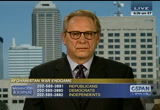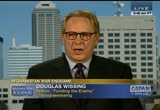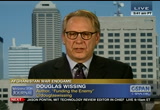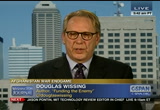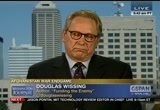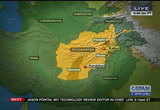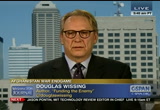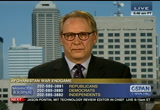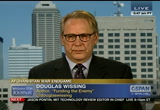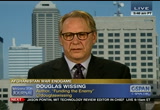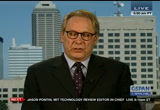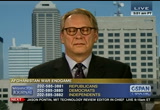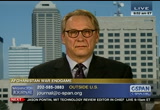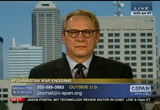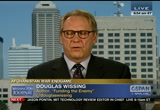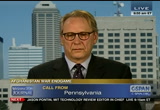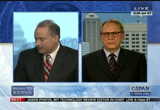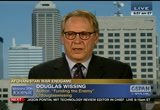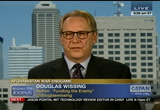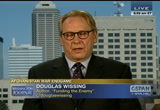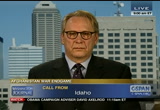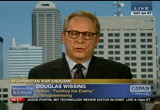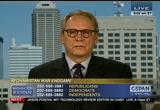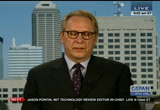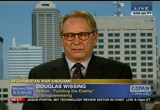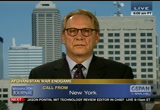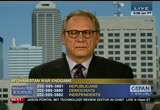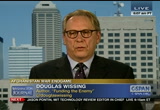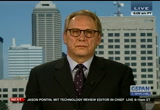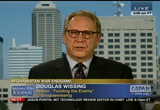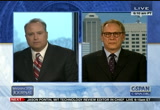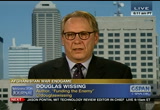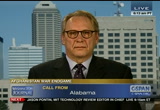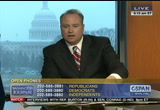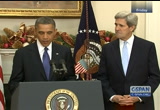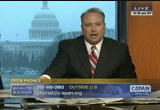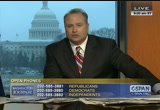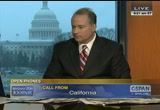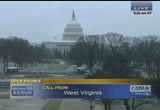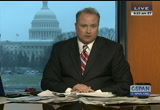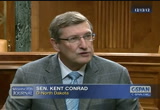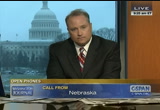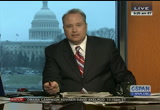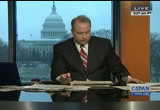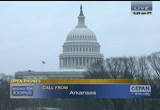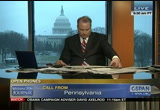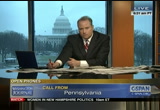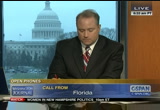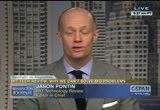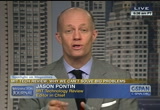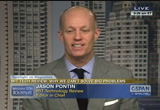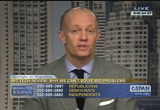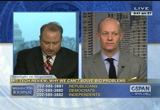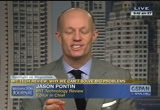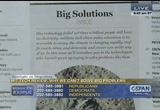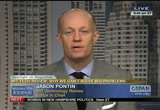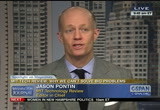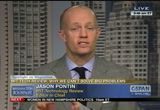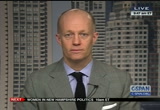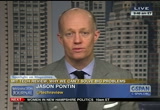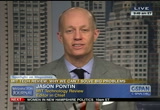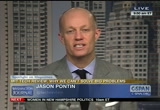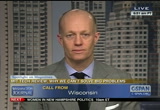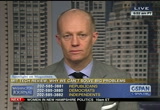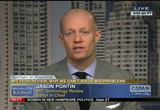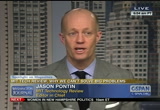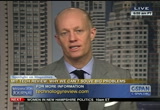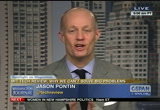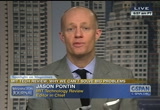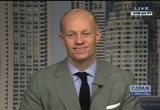tv Washington Journal CSPAN December 26, 2012 7:00am-10:00am EST
7:00 am
professor gets his economic forecast for the next year. then the end gain on the war in afghanistan and the editor -- editor-in-chief of nip review of -- -- mit review. host: we heard overnight president obama is cutting short his vacation to hawaii. he is returning to deal with economic matters, the fiscal cliff. if his death has been quietly talking with senate democrats are the christmas holiday to come up with a planned to avert or prevent the cliff. in the meantime, the senate does plan a session tomorrow. perhaps we will hear more about
7:01 am
an agreement before the new year's deadline. the house is due tomorrow as well. we do not have an agenda and there. with the fiscal cliffhanging out there heading into the year 2013, do you have optimism or pessimism heading into the new ? you can also send in your comment via twitter, a post a comment on facebook, or write us an e-mail. the theme of optimism or lack of it is prevalent in the papers. wednesday with congress and the president heading back to washington. here is a headline on "usa
7:03 am
7:04 am
7:05 am
of a flurry of activity tomorrow. if first call. what is your name and where are you calling from? i think that caller is gone. let's try the next call. caller: i am optimistic because this is a great country. we are one nation under god that. i think people ought to turn to their faith during these times because we have always needed to through hard times. host: how will this play in washington but the fiscal glove? caller: i think the republicans are going to have to give it more than the democrats. president obama is basically
7:06 am
going to do with the people voted him in for. i think he will give a little on the so-called entitlements. over all the democrats will come out ahead. host: but different jerry now in hillside, illinois. caller: i am pretty much optimistic. i heard the first caller, what she was talking about. these cuts that the democrats are proposing, there are well down the light. they won the taxes now. by the time the cuts come in, this ought to be turned around and it was said, we do not need the cuts now that if it has turned around. host: lots of comments coming in of this but so far. one caller rights --
7:07 am
sarasota, florida on the line now. good morning, jill. caller: did morning. i have only one very short thing to say. listen, everyone out there. no matter what party believe in, they're used to be a wonderful country in africa called rhodesia. we are talking about african problems, but it was a bread basket country. produce things. now it is called zimbabwe. inflation is over 1000%.
7:08 am
that is all i am going to say to the people watching and listening to this program because we are heading in the same direction. thank you and have a wonderful new year. host: a tear from bob now in the democrat light. caller: thank you for letting me have a chance to speak. i am more optimistic -- i a more pessimistic than optimistic. i just do not think they will ever get together like they should. my one comment is when they start speaking about the cuts and the entitlements, the always a social security, medicare, medicaid. that is not the only entitlements.
7:09 am
every government program that has a retirement benefit, a health-care benefit, those are entitlements, two, up to and including the entitlements for the congressman. let's be fair. when they start talking about entitlements and hold it to those three items, let's hold their feet to the fire and make them talk about entitlements for the other folks, too. host: appreciate you calling this morning. donna writes about this on twitter. if that to facebook here. -- back to you facebook here.
7:10 am
7:11 am
you can watch the byplay here on the c-span that works with the president heading back to town tonight. the senate and house are due back tomorrow. billy from jacksonville, florida, to life for waiting. caller: i am very optimistic but i worry that the president will not get a chance because lindsey gramm already stated he will fight. i think there will already be another big fight for the debt ceiling. host: how does that make you optimistic that? caller: they know they have to do something, and they are going to do it no matter what. there does try to save face. they're going to do something to
7:12 am
make the country go forward. host: let's hear from another billy from florida. good morning of the independent line. caller: hope you had a very christmas and happy new year. i am an independent, i am a born-again christian and a vietnam veteran. i believe that the republicans and democrats both are holding the country like in an ambush situation. there are going over the cliff without any doubt in my mind. there are looking at the election of 2014 and 2006 to more than the people. thank you for your time. pfft host: good morning to you, elmer. what is your level of optimism heading into 2013? caller: i am kind of scared.
7:13 am
the statement i went to bed, why do we not get in contact with george bush. i think he should be in here on the deal because it was him and that got us in this position we are in. he cannot even tolerate position said they have going on with our congress. if the people out here for us to be taking care of, if they have enough money to take over to another country the way they demonstrate, that is what we are in this position that we are in. i think we should get in contact with george bush and see if he can get us out of this. host: here is a piece in "the washington post." if there is a photo of the first couple greeting military personnel.
7:14 am
this is the president remained largely out of sight golfing and spending time with his family. he left washington late on friday. a little progress has been made on the cliff talks, but at least the talking is continuing. we have a call from mike out in florida. caller: good morning. i am a bit pessimistic. i believe that on c-span they had an economist on here explaining how americans do not understand the difference between millions, billions, in trillions. with the trillions of dollars in debt, he put it into the context of time.
7:15 am
1 million seconds will take 11 days to pass. 1 billion seconds will pass in 32 years. when trillion seconds will pass in 32,000 years. i think it is almost impossible to see how we will ever pay off this debt. that is all i have to say. host: that was mike from florida. plenty more time for your calls, facebook postings, and it tweets.- tonight on prime time we're going to sit down with a couple of retiring members of congress. dan burton and kent conrad. a little snippet from each interview. we will show you now congressman
7:16 am
burton. [video clip] >> i would like for people to think, he might have been a bulldog, but he was a man who believed in honesty and integrity of things that were right for this country. regardless of how difficult it was, he kept to those principles. i hope they will look at me like that. i know a lot of people think i am a bad guy and a goofy things, i hope they think i am a man of integrity. host: that will be tonight at 8:00 followed by kent conrad after that. about a half-hour interview with each of them. we will continue to play that thereof the week. here is a headline from "the washington times."
7:17 am
much from ohio. good morning. caller: i am positive and helpful -- i am looking for 2013 to be a good year. i retired at the selfridge -- self-employed. i am hoping the if it will be a good year. host: what are you hearing or seeing that makes you more optimistic that some of our other callers? caller: a desire to feel
7:18 am
positive. i retired last spring. i am just hoping the if everyone else is positive, people will be hired. i did and not other people to pay my wages. everyone should just be positive. with everything we have been through, i hope 2013 is a good one. host: let's hear from steve. you are on the democrat's lead. caller: i would like to say merry christmas to you and to all the united states of america. i am actually very pessimistic about a deal being struck. when you look at the republican party and their entire congress who comes out with a statement that this country does not have a revenue problem, it is just an outright lie. if you look at the facts, 32% of
7:19 am
our manufacturing base has been gutted and sold to china, india, any foreign country that has cheap labor. the top patriotic american companies are parking their profits and offshore accounts so they do not have to pay a fair share of their taxes. the bottom line is since the late '70s, the wealthiest 2% in this country are making 25 times their wealth that they made a black -- back then. there are only paying 40% more in taxes. this country is doomed if we do not start putting terrace of the imports coming into this country. the republican party is selling you an outright lie. thank you. host: let's show you a facebook posting.
7:20 am
the economist and professor at the university of maryland will be with us and about 25 minutes or so. he will take your calls and give you his economic outlook for 2013. he has written a lot on the matter. from west virginia, independent. caller: is, sir. i would just like to say that i am not very optimistic above the future of the united states right now. we are in so much that it is pathetic. our budget is way over. this president was elected on the back of 51% of the people that is on some kind of a public bill. if people were working, they would never elect him as president. host: if what happens next?
7:21 am
caller: what happens next as we go over the fiscal cliff, social security and everything is going to be cut. they are going to raise and put more people on welfare, food stamps because the country is not going to have jobs come back, no way. the taxes are too high. there try to tax the people too much. they keep saying the rich paying their fair share, the bridge for the only people who pay taxes. the sec, they pay state taxes and this tax, they sure do. but they get a refund of their income tax credits to pay the taxes. they do not pay any taxes. host: here is a tweet from thomas hnderson. matt coleman writes--
7:22 am
7:23 am
cliff. i was wondering why the congress does not want to work with the president to pass this thing? host: what are your thoughts? caller: i believe they're going to make a deal. i have been watching the news and everything like that, and i do not see the republican -- john boehner is working with the president to do anything. they do not do anything. they have -- they do not work with the president. i am wondering, why does he not work for the american people that they elected to do the american people business, not their business. host: thank you for calling. a live picture of the u.s. capitol. 7:23 in washington.
7:24 am
some heavy rain and perhaps some snow. a. when terry mix are expecting in town. we mention that because the president is heading back into town. the senate and white house -- the senate and house are due back tomorrow. this is an politico. there is another piece of this morning that says the house member elect is also interested
7:25 am
in the peak in the seat -- adapter the seat. springfield, va., lewis, an independent. caller: good morning. you could consider me a little bit pessimistic. i am actually looking at it as realistically as possible. i have a degree in macroeconomics. i believe that they all should be -- we should institute term limits on all of them. maybe a six-year term limit. they're all thinking of reelection. host: both sides? caller: yes. they are thinking about re- election with the country is almost $70 trillion in debt. -- $17 trillion.
7:26 am
people and businesses are giving out payouts because taxes are going up on everyone. it does not matter -- there are too many taxes going up. payroll taxes going up. we do not even know what the alternative minimum tax rates are going to be for this year. that creates an environment of complete uncertainty. they have people rushing to buy gold, silver, in some of these other commodities. i think the star with term-limit thing politicians so that once they do get elected, they handle our business. you and i and everyone else, we have budgets. we have to balance our budget. fifth we cannot spend more than we take in. if we do we run into issues.
7:27 am
7:28 am
trisha is on the line from indiana, a democrat. caller: i am very glad to talk to you. happy holidays to everybody. i just had a comment on the fiscal of debate and have a look to us in the future. i really think that the gentlemen, i think he was from virginia, had a good point about term limits. there are politicians of both
7:29 am
sides that are making a life career out of being a politician instead of getting elected to serve the people they are elected by. i really believe that if we instituted term limits for everyone in public office from our mayors to our elected federal officials that it would make a big difference in their decision making. i wanted to comment about the republican about-mr. obama being elected by 51% of people getting a handout. my husband works full time. we do not get food stamps, welfare -- did i get any of that. my husband is hard working. i work part-time job. we do not get handouts from the federal government.
7:30 am
we elected president obama. i believe there has been a lot of misinformation deliberately put out about why this president was elected. i think we need to chase that. host: fifth let's hear from me now from midland, michigan. caller: i think it looks pretty good. i do not know how they are going to print out all of the new tax forms by the time we go to fill out our taxes. i am a republican and a bit less than $15,000 a year. i will pick up a beer can or a beer bottle when i am going down the street. most definitely. i have to collect them some days just to get by. as far as kicking the can of the road, i believe -- i do not believe in that.
7:31 am
i think republicans have to face the fact that the conservatives always believe in a balanced budget. they always do. they have to scale down the monstrosity of a government they have. host: a reminder to all of our callers, please keep the sound of doubt on your tv set at home. -- keep the sound down on your tv set at home. here is a short piece from the interview on why the senator is leaving office. [video clip] >> many reasons. i have served here 20 years. less than 5 percent have serve that long. some of it is i am tired of
7:32 am
living out of a suitcase. i miss 80% of my wife's birthdays and anniversaries. and i thought, it is time for somebody else to take this on. sometimes change is a good thing. after 26 years, i felt the need to have somebody else take these responsibilities on. host: what of the retirees tonight. -- one of the retirees tonight. there is a texan who is now the oldest to serve in the house. this is the federal page in the washington post. his colleagues admire his stand up. if they write --
7:33 am
7:34 am
i am worried about money. i'm on social security. cast ago to $7 a gallon. gas is high all over. -- gas can go to $7 a gallon. i believe in term limits. i believe if we had a one-term president, we would not give this president again. i believe in them for judges and any politician. they become career politicians. they are out for themselves and not for the people. what i do not understand and what is never in the news, i know people that are still working at 75 years old. they have been getting social security for 10 years keeping jobs from number people. you never hear about this.
7:35 am
they are totally greedy just like the politicians. that is about all i have to say. thank you. host: thank you for calling. caller: i am optimistic. i think our country is a great country. i think that the president is doing a good job. i am kind of nervous, because this is my first time calling. host: take your time. caller: ok. i think we need to get tougher on our spending. i think the government is giving out a little bit too much right now. that is about all i have to say. host: richard for rochester, new hampshire. what are your thoughts? caller: i certainly hope we take a nosedive right off the cliff.
7:36 am
i am sick and tired of the republicans in the right wielders blaming the poor for our lack of incumbent into the treasury. we do not have the money to get to you. -- the lack of in come into the treasury. host: janice from alabama. a republican. caller: how are you? fear after being unemployed for years. i am still optimistic. i can see myself hopefully moving up to at least a part- time position. the thing about it is, i have gone through turmoil after losing my last job that i had in 2009. after being a full-time on somebody's payroll and that lost the job in the 1988, i went from
7:37 am
one job to another every three years. i am in the unemployment line trying to find work. i was denied unemployment because of how they got rid of me. i had to go to court on that. they still did not want to give it to me. the only thing i have at the present time, i worked as a bell ringer with the salvation army. a lot of people kind of look down on people like that. i am at a point where i feel like i am being held and pushed them.
7:38 am
if anybody knows what i am talking about, they understand. it is close to another hospital down here. it was designed to help with the call the poor people, people who cannot afford health insurance. after i lost my job in 1988, if i was not going to apply to get the system twice. host: thank you for sharing your situation with this. we want to squeeze in a couple of other calls. what is a lead editorial in "the washington times."
7:39 am
7:40 am
john on the democratic line. what is your level of optimism? caller: i am just wondering if we are going to have a new cabinet next year. host: would do you think? caller: we might. maybe things would change. host: any names in mind? caller: no names, just a new cabinet. host: we have another job on the line from massachusetts. caller: i am a disabled american. i have paid into social security system and medicare for 40 years, which it was about 2100 paychecks and a money from my ssdi and medicare was taken out of my disability checks and medicare was not free. if it was not a handout.
7:41 am
7:42 am
janesville, wisconsin, independent. good morning. what is your level of optimism? caller: i am not very optimistic they will get anything done. i am not optimistic that will find a job. host: what kind of work are you looking for? caller: anything. i cannot even get hired at a retail store because i do not have experience. i have the manufacturing all of my life. i lost my job in 2008. i have updated my skills, and still, no calls. host: when you look at people in washington and what they are dealing with, what goes through your mind? caller: i think they are out of touch with the people. i think the unemployment rate is a lot higher than the what they say it is. host: thank you for calling.
7:43 am
steve is calling from troy, michigan. caller: there has been a lot of misrepresentation of the fax. i am not very optimistic for the future of our country. -- misrepresentation of the f acts. taxes will be going up no matter what they do. gm does not pay any taxes and they ship jobs out of the country. he does not pay taxes. it is not just the republicans that do that, the democrats do that as much as the republicans. host: if you could change one thing about the way they do business here, what would you do? caller: do these things that rights of people could see how they are voting. just like he shut the what the earlier about how they added onto the bill -- just like he
7:44 am
showed how they did earlier about added billions of dollars to go other places. i believe they operate normally like that. host: to lie to everybody who called. if you did not get it done this for -- thank you to everybody who called. if you did not get through, stick around. later we will talk with douglas wissing, a book called "funding the enemy." we will be back. [captions copyright national cable satellite corp. 2012] [captioning performed by national captioning institute]
7:45 am
>> the soviets put the missiles in cuba. the united states discovered that. then the tension builds. we have a blockade around cuba. what of the things that happens is a soviet submarine is found by american ships and a start to drop assault charges -- debt charges on the submarine. it knocked out the electrical system. people were passing out and side of the submarine. they have no communications with the kremlin. the commander says, look the torpedoes. but attack.
7:46 am
the war probably started already up above it. he told them to launch a nuclear torpedoes. he said they're ready to launch. fortunately, one of the other commanders talked him out of it. he might have saved the world. >> this is so close to the edge. it really was one of the scariest moments. >> scariest moment in the human history. >> i am grateful. that is what all this criticism of kennedy and all this -- we would not even be here to talk. fest >> the untold history of the united states, saturday night at 10:00 eastern on "after words."
7:47 am
host: back at the table, peter morici from the university of maryland. how optimistic are you about the economy? guest: in the new year, i think they come to some resolution of the fiscal cliff. we are looking forward to another year like we had. 2% growth are a little less. the prospects this quarter were impaired by the cliff, and we expect that to go forward into the next quarter. host: the president coming into town tonight, and the congress tomorrow. realistically, what do you think will happen? guest: i do not think a lot will happen and i think we will go over the cliff. i am an economist, not a politician. i do not believe that the republicans will give the president merely a tax increase on people over $250,000. there are not able to push that
7:48 am
through the house with some spending cuts. that does not seem to make much sense. host: peter will be here for 40 minutes taking your calls and tweets about the u.s. economy. we continue to take a look at economic matters. our guest recently wrote about the debt limit. the headline in "the boston globe" -- do you agree with that sentiment? guest: i would hope it would not threaten the economy again. it is all bound up in this issue of curbing government spending. we cannot let our debt continue to grow at the pace it has been growing. we do have an advantage that greece does not have. we print the world's money. we cannot expect the dollar will be keen to tomorrow.
7:49 am
-- forever. if the europeans can manage their deficit and we cannot, the world will switch to euros. there is a tweet here -- guest: the cbo is supposed to be a political, but it cannot be too alarmist. if we go over the cliff, we are looking on january 1, some of this is already milton. about $600 million -- $650 billion in spending cuts and tax increases. that is about 4% of gdp. that is an enormous negative stimulus. a detraction from demand. that would surely be a deep recession. the cbo relies on simulation
7:50 am
models that did not take into consideration investor sentiment, the reaction of consumers, and so forth that they wholly lose confidence in their government. if we go over the cliff and stay there, people will start to conclude that washington cannot manage its affairs. all bets are off on economic modeling. it is impossible to say what happened that other than it would be very negative. host: one piece that you actually did right has this headline -- take the idea of a recession next year. with the perspective of everything else going on, when a recession look like? guest: it depends on how we get there. if we have a fiscal cliff deal, the kind the republicans were pushing through last week, it was really no government spending cuts for two years. additional revenue that would be raised was not very much. that would not cause a recession.
7:51 am
however, if we got a deal where the president got $100 billion in additional taxes from upper income people and he got $100 billion in the immediate spending cuts as the republicans would want to match it, subtracting $2 billion it is a little over 1% of gdp. that would push us into a mild recession. unemployment was start to creep up. if we got the bigger than that, $300 billion in spending cuts and tax increases, that we would have a severe recession of the kind from which the economy could not easily recover. host: first call is lydia. caller: i had a question for the doctor morici. over the last four years, everything the president has tried to propose to get the country back to work, jobs he has proposed, the infrastructure and jobs programs, the republicans have a filibuster.
7:52 am
they took an oath before he was sworn in to do everything to make sure he was a one-term president. they have done nothing to help him. everything to try to hurt him. they were not hurting the president, or hurting the american people. when president bush was an office, john boehner, all the rest of them approved every supplemental bill that he set up to fund the wars in afghanistan and iraq, the tax cuts, never a mention of the spending he was doing. now, everything they say is spending. do not have a revenue problem, we have a spending problem. they're very disingenuous. they're not interested in helping the american people. guest: i think it is important to recognize we have a two party system and is the obligation to oppose, the loyal opposition.
7:53 am
that is what the republicans are doing. but to be fair, the president got most of his agenda for the first two years. he got his health care program, and he got his stimulus package pretty much the way he wanted it. in fact, a little extra. he did have a democratic congress. as a consequence, over the last six years from the time it's the policy became speaker of the house to read the financial crisis the next six years government spending has increased about $1.10 trillion. only about $350 billion of that has been for inflation. the rest of it has been a in addition to programs. we were told these programs in light of the recession and the financial crisis would be temporary. he repeatedly said, a temporary is a characteristic of the stimulus package that one. it has become a permanent.
7:54 am
i think republicans are correct in saying we have a spending problem. in the last year before the financial crisis, government deficit was $161 billion. today it is almost one trillion dollars larger. two-thirds of that is additional spending. i think the republicans have a case. did the president get everything he wanted? no. i did not think every president has ever gotten everything he wanted. host:twitter question. guest: i did nothing there are taking a hard stance. the problem with $250,000 is it is not the altar rich. if you are in new york city, schoolteachers and firemen make $100,000 a year and they are easily in households the approach the limit. it depends and where you live.
7:55 am
among high-income people, there is a wide range of what people pay in taxes. if you're a lawyer in washington, i find them to be reasonable people who work long hours. you are probably paying 28%. if you are on wall street and you are well-connected if you have a capacity to have your income defined as investment as opposed to salary even though it is indeed salary income. if you are somebody like jamie dimon or warren buffet, you can get away with 14% tax. the real problem with upper individuals are not the people who pay the taxes we intend for the to pay, but all the people who get away without paying any taxes at all. those tax breaks and write offs are derived by the president and by democrats, but they never seem to get fixed. one reason is republicans do not want them fixed. and the other hand, the
7:56 am
democrats get a lot of campaign contributions from wall street. that is a real problem on both sides of the aisle. host: 1 had led we touched on earlier in the show. is probably worth saving again. -- one headline from earlier in the show. they say one possible solution -- if republican leaders let democrats provide most of the votes, possibly turning to house democrats at this point. guest: it depends what the republicans in the middle are willing to tolerate. the tea party people do not have to worry about getting reelected, republican moderates do. they are not going to willingly propose spending cuts. there is no reason for them to propose the now. there are good economic reasons, but there is no reason for us to suspect that they will.
7:57 am
it will come out to moderate democrats to say they have a better chance to get reelected to vote for tax increases of people over $250,000. i was on the radio this morning before i came here with wor, and i was being interviewed by the county executive of winchester county that was filling in. he was complaining that all of these ordinary working people are going to pay higher taxes. they almost religiously without exception vote for democratic presidential candidates. if you look at the big cities, ordinary people are going to get walloped. if you look at the places where that is, those are where you pretty much have solid democratic votes.
7:58 am
were you have republican votes, they will not get affected by this. yes, there is a possibility there. host: when your may have heard that interview. the day write -- -- they write -- guest: we have one tax policy no matter where you live and what the cost of living is. that does not work very well there are parts of the country where people make very significant amounts of money relative to $250,000 for the cost of living is very high. these tax increases are going to bite in bite hard. that is unfortunate. suppose we had a classroom where three of the children were much wealthier than the others. the teacher said, we really want to go on one good field trip a month. how about we have a vote as to
7:59 am
who pays for the field trip. we will send each of their parents a bill for 10 children. and they vote yes. the teacher said, we had a vote and it was by democracy. that has about as much credibility as 51% of the population voting for a man who wants to raise taxes on 2% of the population. i think thomas jefferson would be rolling over in his grave if he thought this was an accurate represent patient of democracy. the republicans won the house. they have a mandate, too. the president was not elected president, speaker of the house, and chairman of the senate. the constitution provides that taxes emanate from the house of representatives where the president does not have a majority. host: our guest, peter morici,
8:00 am
is an economics professor from the university of maryland. he writes a lot, will more than one dozen books. guest: i got my ph.d. in 1974. i was only 11 years old at that time. host: you also write a budget deal could push unemployment to above 10%. house so -- how so? guest: when you raise taxes on somebody by $150 billion a year, all above what we are expecting. the payroll tax going away. and you cut spending by $150 billion, that's the type of deal republicans were talking about going along with. i think that would push us into recession.
8:01 am
i've been disappointed with the quality of the economics that the president has been getting from his advisers. i am even more disappointed with the quality of the economics that the republicans, especially the tea party, have been getting. if they think this fiscal fundamentalism that has been practiced in greece, spain, portugal, right now, with massive cuts will be good for the u.s. economy, they are sadly mistaken. $300 billion, that could spike unemployment in the teens. that kind of recession would not be one from which the economy could easily read resurrect consumer spending. host: ed is on the line. caller: how are you? observing the president over the
8:02 am
past four years, it seems he is delivering on what he promised, which is he was coined to fundamentally change america. through these economic policies of the spending program, the growing dependency on government by not only individuals but corporations, it seems he is getting what he wants. it seems to me that going over the clip will just be another blow to the u.s. economy, which will help his political position. it seems the dependency -- it seems dependency has been the game. americans have to rely more on the political class to save them more dependent they become one government. it is frightening. the president is going to fundamentally change america.
8:03 am
he is delivering on its promise. we have not seen the devastation of the health care system that is coming. 30 million people getting dumped into the existing health care arena with no realistic way of dealing with this increased number of people. host: what do you think? guest: i think the president has a vision of america similar to the european vision, continental european vision of democracy. sort of a franco-german vision appeared that requires a much larger state. if we went over the cliff, we would have $600 billion in additional taxes next year. $100 billion already baked into the cake. another -- excuse me, that is too lorton #. it would be about $5 billion or $6 billion. that would cut the deficit in half. that would affect the ability to finance this larger government
8:04 am
than he has created. so that would be consistent with his vision. then we would have a cry for tax reform act of top rates on the wealthy would be too high if you are running a small business. so they would eliminate some deductions. the tax burden overall would be about the same. and the deficit if with starts to wind down. the problem is president obama has also presided over a french- style growth rates of 2% per year. is not the worst of jamee have been been in the post world war era. -- this is not the worst jam. reagan had the economy growing at 6%. whereas mr. obama, to%. the downside has been the notion of accepting a much slower broken.
8:05 am
longer-term, the pyramid of our society is getting more like a column, because we're having more and more older people -- people are living older and we can raise the retirement age. even with that we will have a larger elderly population to take care of. 2% growth becomes very difficult to maintain our commitments to the elderly. if you think it's a great idea if you are 40 right now and it actually happens, you will have a lot of tears. host: greg in north carolina, independence, for peter morici. caller: dr. morici, i guess my question is pretty simple. i just want to know, i noticed that republicans and democrats squabble about a lot of stuff, they are partisan about a lot of issues, but nobody is partisan about the division of motor
8:06 am
vehicles. can we afford something like that? can we afford more and more legislation glacially moving in the wrong direction? people are looking for work. when you restrict mobility, you restrict life and earnings. can we afford that? can we afford the war on drugs? with the fiscal cliff looming in the background, why aren't we looking at something like that? even republicans say, social security, but no one really e- books at the division of motor vehicles, the national state registry, a patriot act, homeland security. guest: there are two dimensions. one of them is whether we can afford to pay for the bureaucrats. the government employees in washington who administer those.
8:07 am
over the last six years, spending has increased six under $65 million. i predict it will continue increasing another $1.10 trillion by the end of the decade. if that happens, and as we are willing to unseal a massive increase in the deficit, the problem is it is not finance the oil. either have to eliminate the defense department or eliminate all civilian employees. you would not able to administer all this regulation if you don't do something about spending. even with tax increases, the kind i described in the previous question, would not be enough. ineffective regulation. effective regulation can be quite beneficial. in the automobile sector, the mileage requirement, but permits everybody to strive to a higher mark, up chiselling on
8:08 am
the mileage stickers on cars. it improves our energy efficiency. that's a good thing. that is spurring growth. but the kind of reforms we have on wall street have not solved the problem. look at what happened last week's at usb, not only wild and irresponsible behavior, but then we have attorney general holder determining that he general holderubs the fullest -- attorney general holders a betty cannot prosecute ubs because he is afraid ubs is too big to shut down and would destroy financial markets. i thought dodd-frank was supposed to fix that. what was so disconcerting was the democrats did not join senator grassley in their u.n outcry about that protect the integrity of financial markets.
8:09 am
it is something that should be bipartisan. but it is not, apparently. that is an example of regulation cannot afford. not all it is it is expensive, it's keeping people from getting loans, and it is impeding economic growth, which we need to pay for that column i talked about. host: on twitter -- guest: it is not. it is something people gravitate to because they use a rhetorical device to say there's a way out. bowles-simpson was created on an unbalanced panel. the president had 60 votes in the senate and a majority in the house. very liberal democrats basically and moderate republicans that he put on the panel. it came up with a set of solutions. the president is even more to the left than their solution. he wants nothing but additional taxes. it is unacceptable to the tea party. i have bad news for the tea
8:10 am
party. and for party president's whether it is eric cantor from virginia, the majority leader in the house, or the president, but neither of them were elected to make all the roles and come to all the decisions. sort of middle ground will live to be found. simpson-bowles does not provide it. i will give you example. they raise the retirement age by a year or two very slowly. the retirement age task ago to 70 or there's no way out on social security. numbers tell us that. it is that simple. at the same time, its only marginally increases the retirement age and creates a new benefit for high stress occupations. 1,722,000 people would qualify, but all experience with these things, whether you are a republican from georgia or a liberal democrat from manhattan, as soon as a law like that gets passed, people become creative in finding ways to qualify. out of the woodwork, all the
8:11 am
folks that would qualify. at the end of the david acton & social security age for everybody was truly disabled and let the market take care of its. people in stress occupations for many years now have been leaving those stress occupations well old age of 65 to go into some other line of work. a good example is people that install floors. it's tough in your knees. you see very few people doing that passed the age of 40. they find other work in the construction sector. baseball players have saw money, they don't have to work when they are done. host: let's hear from paul, a republican, in indiana. caller: how are you? there's a competing network of button tot has a access "rise above." if i had a button, it would say stop wasteful spending.
8:12 am
how much money we would save if we stop wasteful spending. guest: we could also find our sunny and obscure and ridiculous government spending programs. congressmen are quite apt at getting projects plug into legislation. more fundamentally, the real problem is we are simply spending more than we can afford. unless we are willing to accept extraordinarily higher taxes -- we're talking about raising income-tax -- raising of taxes by 50%, not just income tax, we cannot balance the budget. so we have to spend less. if we look at the entitlement programs, let's look and health care. the u.s. spends 18% of gdp on health care. the germans spend 12%.
8:13 am
everybody over there is covered and they have much better outcomes. clearly, we are doing something wrong. obamacare does not fix that. and senator bryan, with his about trips for the elderly, not going to lead to a better outcome.-- senator paul ryan. neither party is willing to address that because it requires tough choices americans are not willing to hear about. the only person in a position to tell them about that is the man in the white house, because he does not have to run for reelection. he the only guy with term limits. taxes --k taxes -to guest: think about all the
8:14 am
gaming that would go on into that. from a theoretical perspective, real income being taxed would be better than taxing nominal income, which is what you are talking about, being taxed the same real income the same. unfortunately, that would likely be to all kinds of costs that would far outweigh the benefits. as it is, we computer and consumer price index in each region of the country. it is subject to criticism because there are limits to what economists can do. i don't think economists should have that responsibility. host: let's go to belleville, michigan, denise is an independent. caller: good morning. it's an honor to speak to you, professor. it quickly reply to that republican, the bill but the senators tried to pass, a 60,000 billion for sandy on the east pork inhere's a lot of
8:15 am
that. call your delegates. my question to you, in regard to what i've heard on president obama in regard to social security is trying to incorporate changes cpi -- chained cpi. a person would pay $1,200 more in one year and over. 30 years, $28,000. could you go in depth on that for me? guest: there are different ways of computing the consumer price index. one of those is to change how much we saved for food and shelter and so forth for the proportions of the previous year as opposed to a base year. that gives you a somewhat lower rate of inflation. economists would argue that is more realistic and a fairer way
8:16 am
to index and the government benefits. i have a problem with that. as an economist, i'm interested in perfection of measurement. as a guide u.s. to operate in washington, i am also concerned with equity. older folks really have a different basket of goods than and people. when was the last time grandma and grandpa went out and bought a suite of bedroom furniture. young folks do that. where is older folks spend much more in health care. the cpi is biased against older people, because their basket of goods is different than the general basket of goods. and erston boles did identified that canada wanted to do something about it. the president wanted to do something about it, but only for low-income vegetablindividuals. the cpr under shoots of older people pay, their inflation
8:17 am
rate, so i'm kind of against that kind of solution. gimmickss the kind of america getting on the republican side. we have a democratic president right now who is an ideologue. we also just had republican presidentswho have the same problem. in the house of representatives, but talk a good game about wanting spending cuts. when was the last time you saw speaker boehner and say i showed this piece of paper to a president with 11 good spending cuts opportunities in entitlements and he will not buy them? i know of no such piece of paper and other than gimmicks, like the chained cpi. that's one of those gimmicks that keeps us from making progress. we have had a lot of telemetry over the weeks since the election, but not a lot of real discussion on the real nature of the problem. host: mavericks'writes -- guest: actually not.
8:18 am
mr. obama had a democratic congress when he came in, 60 votes in the senate, which , amount-- senator brown had won in massachusetts. but he started out with 60 and then it went down to 59 when senator kennedy and sadly died. i really admired senator kennedy as much as any man who ever served in the senate, even though we did not agree. mr. reagan had to deal with tip o'neill. that was one of the great events in washington politics because you had two extraordinarily capable politician opposing points of view. mr. reagan was poorly matched. mr. obama had nancy pelosi as speaker of the house. but hardly the same thing. host: from massachusetts on the line, democrat. caller: good morning.
8:19 am
i have a comment and question. i am trying to find out, the situation you're in right now, why is everybody fighting about what we should do? i am gmt and i am broke every day. i'm down here with people that paid taxes and work hard every day. -- i am an emt. people don't understand that would ever happens with the fiscal cliff, people down here will survive. the republicans, this will definitely affect them in the future. i talked to people all over boston every day. nobody wants to vote for republicans anymore, because of the fact that they don't seem to care about people that struggle everyday. it's the people that have money but don't care about people who don't have money. it's been like that for hundreds of years. it's time for change.
8:20 am
we have a democrat in the chair. the republicans had their chance when they had pushed. there's a lot of things that should be changed in this world. we rant on about the economics, but we should be worrying about the pollution. without the planet, there's no economics. the focus should be more about our planet right now with the seasons changing at different times of year. i think the focus should be more on the planet and not who has the money and who is gone to cut taxes. without the planet, we have nothing. guest: you have raised two issues. we should emphasize the in burma and the fact that we have a democratic president and he is entitled to his shot. the first two years he got virtually everything he wanted
8:21 am
and he lost the midterm election in part because people did not approve of some of the things he got that he wanted. we don't ever democratic government. we have a democratic president and a democratic senate and republican house. that is the way our government is set up. while it's hard to find a breathing voter in the state of massachusetts who admits to voting for republican, there were many parts of the united states where it's hard to find a voter wh o would admit to voting for democrats. massachusetts is part of a larger country. so that's why we have what we have. it is important to say that speaker banner and the people that he leads, such as they are, and president obama and the people that he leads, such as they are, are deeply committed to the future of the country, but they have very different opinions on how to get there. i pick we live in an era where everybody is environmentalists,
8:22 am
but some of the policies we are pursuing right now really boggled my mind. for example, philadelphia is a democratic city and will get to keep its oil refineries on the basis of taking oil by trainload from north dakota. that makes not a lot of sense when you could be piping it down the content. but philadelphia has its political advantages. it is in alignment with the white house, therefore it is not an uncommon to benefit. also, developing oil in the gulf is probably incrementally safe enough, but we don't do it. -- probably environmentally safe. that was an example of regulatory breakdown. the problem was inadequate regulation in the gulf. putting on more regulation was
8:23 am
prompted to do. it was the problem of regulators not doing their job. when was the last time the u.s. fired by regulators for not doing their job? they fired the engineers on the platform, but they turned the other way -- but not the regulators who turned the apother way. instead they added more regulators. host: there is one face a posting by a sergeant schultz -- can you plug the idea of optimism into all this and it's how much something like optimism can drive a process? guest: optimism is better than pessimism. we're having a lousy quarter because people are pessimistic about the fiscal cliff. why should we be optimistic about america? often i hear from businessmen
8:24 am
complain about dealing with obama. they love to do that. not only in complaining about obama but they say that america is losing. america is not losing. all the brains inside this thing which did not exist six years ago is really american brains. the software, the conceptualization. i know it's made in china or korea, but it's american innovation. the pieces are there. it's a matter of putting them together. the reason i'm so disappointed in this administration and the bush administration is because they have been willing to settle for so little. there's no reason this economy cannot grow at 6%. all the pieces are there. the gentleman in massachusetts emt would not. be broke all the not minimum wage is $7.50.
8:25 am
i don't believe in the minimum wage, an ocean they can get somebody for $7.50 tells me america is not working the way contraptions like this say it should. -- the notion. guest: well, nobody really wants to go over the cliff when it comes to the military. president obama is in a box. he sees china for what it is from the point of view of a military challenge. he wants to increase america's fleet commitment to the pacific. we simply cannot do that and cut defense spending more than he already has. two rounds of defense cuts over and above getting out of iraq and afghanistan. we simply cannot maintain a fleet that way.
8:26 am
there is room for reform in military spending. one area is health care. its shares that problem with the civilian area. secretary panetta, who is no republican, has pointed out that his health care costs are eating up his budget. but we simply cannot cut military spending more. host: paul in riverside, address, republican. caller: thanks for having me. i have a small business. i came from nothing. my father was a state worker. i contribute so much to the tax system through a fuel tax, state tax, all these hidden fees. i make about 60 cows and dollars per year. i pay probably $140 to my employees and people. it is ridiculous when i contribute. i get trash pickup, police protection, fire protection,
8:27 am
snowplows. i think people need to improve. their improve they need to protect their credit, they're driving record. can you imagine getting a dui, that takes from you. you're a criminal record does not allow you to get a job. and drug takes away from everything. if people protected themselves personally and saved a little money, $10 a week, $500 a year, it's a washing machine at the end of the year if you need one, you don't have to borrow. people have gotten away from this. they are so dependent on the government helping and there are 25-year-old living with their parents, the biggest babies in the world. it is ridiculous. we don't talk about this enough. this is important. people just are not ready to grow up. i feel like if you do these
8:28 am
little things, in the education system from sixth grade through 12th grade every year -- everyone knows who george washington is, but you should have a class every year that allows you to live in a better neighborhood and allows you to buy a home, and giving people a credit, and allows them to get a car with a low-interest rate. guest: a real problem in american education is we are no longer in a position to require high personal standards. good example, when i was in college, i got a piece of paper when i was a freshman, i went to a state teachers college in new york state, wonderful institution. they said we expect our students and i read with to endure to my personal standards or we will throw you out of here. that's basically what the paper said. that then filters down. we don't have that anymore.
8:29 am
instead we hear about people come from different backgrounds and different cultures. i came from different backgrounds and a difficult to prevent him from an italian immigrant family in new york city. my father was aborted or salesman. his father was a boston homemaker and the man before him rolled cigars. in a world of white collar america, that was absolutely foreign to me. i was told what was expected of me and to shape up or to stay in shape. we don't have that anymore. instead we have university presidents who have batteries of lawyers, school superintendents with batteries of lawyers, who are afraid of lawyers prepare something in you say, but you missed a lot of things. the dependency issue as well. they don't have to be republican or conservative to think people should live personally responsible lives. most very liberal members of congress to as well. that's how they got there. host: our guest has been peter
8:30 am
morici, economics professor at the university maryland. thanks for your information. guest: always nice to visit. host: we're halfway through its wednesday edition of the washington journal. it is december 26. coming up after a short break we will focus on the afghanistan exit strategy with author douglas waissing. he will also talk about his book. later, m.i.t. tech quality review editor in chief jason pontin, a cover story focusing on why we are not solving the problems. we will be right back. >> ♪ [video clip] >> i enjoy that it is straightforward, comprehensive, you can really sense what is
8:31 am
happening without someone else interjecting, a pundit. that i appreciate about c-span, a great resource for anyone looking to become more familiar with how government works and the ins and outs of capitol hill. >> unduly watches c-span on verizon. c-span, created by america's cable companies in 1979. brought to you as a public service by your television provider. -- julie watches c-span on verizon. washington journal continues. host: joining us on indianapolis is doug wissing, author of "funding and the enemy." we are talking about afghanistan and the end game. first, the title of your book that you wrote this year, how u.s. taxpayers bankrolled the taliban, remind us of what you were right thing? -- were writing.
8:32 am
guest: i am sorry. i'm getting feedback in my earphone. if you could come off my audio, thank you. when i was imbedded with u.s. soldiers in afghanistan, i began to realize that the soldiers were trying to explain to me that there was a toxics system that was connecting distracted american officials, -- i'm sorry, i'm back to getting this in my ear phone. host: we will see if they can fix it. if you can try to continue, we will try to fix it. guest: there was a toxic network, hearing myself twice simply does not work. there was a toxic network that was connecting distracted american officials, u.s. corporations, military- industrial and development and
8:33 am
industrial complex corporations, corrupt afghan insiders, and the taliban. we would be driving around in taliban country and these and for operating bases and the soldiers would be saying we are funding both sides of this war, we are funding our enemy. if they say it was like the mafia where everybody was in on the take. one particular intelligence officer told me it is the perfect war, everybody makes money. at first i thought the soldiers were exaggerated, they were being security soldiers and telling me things. but as i began to investigate in afghanistan, talking officers, talking to develop and officials, i began to realize that we were indeed funding the taliban, u.s. taxpayers are funding the taliban. so i got back and started researching and worked my way
8:34 am
through a mountain of government reports. and media reports, white papers, and spoke with hundreds of people from ambassadors and generals down to development officers and soldiers on the ground. and that is the case, we are funding the taliban. host: our guest is doug wissing, the author of "funding the enemy." he is speaking to us from indianapolis this morning. in a couple minutes we will take your questions and comments. here's the book he was just referencing on u.s. taxpayers bankroll the taliban. he's an award winning independent journalist and as reported widely on the afghan war. how many times have you been there? when was the last time? and what do you make of the process of the end game at this time with the troops? guest: i was in that part of the world before 9/11 and then i imbedded twice with u.s. troops in afghanistan and and headed
8:35 am
back in a few days. i will leave on new year's eve. there seems to be a lot of divergence stories going on there. there's a certain discussions between what is said from the podiums in washington and kabul and what the ground reality appears to be, based on my interviews with folks out there. i am hoping to understand it better to the work i will be doing in eastern and southern afghanistan and the research i will be doing in kabul. host: let me remind viewers of our phone numbers. our guest has authored six books total, including
8:36 am
"pioneers." i should point out that the afghan leader will be meeting with president obama in washington in early january. denver is 7, we understand. what do you make of that pending visit and what that conversation will? --will be like?nuary 7 guest: it will be about the remaining forces and what rules will govern incarceration policies for insurgents that have been captured and i'm sure there are a number of other things on the agenda. but those are the primary things they will discuss. host: back to your trouavels, what our soldiers telling you about the war effort from their perspective in afghanistan? guest: i am finding
8:37 am
extraordinary courage on the part of the soldiers. it is quite an amazing experience to be embedded with them. i hear a lot of cynical soldiers, dispirited soldiers who talk about how we are trying prop up one of the most corrupt governments on the planet. afghanistan typically ranks number two or number three as most corrupt in the world. it is no. 6 on the failed states list. the soldiers are very aware of this. there is what is called the ground reality. uth on the ground is sometimes different from what you hear from spokespersons. host: our first caller is robert from massachusetts, a democrat. you are on with douglas wising, in indianapolis. hello, robert. caller: hi.
8:38 am
if you could comment on the historical background of the wars that have been fought over the last 200 years? the people have backed both sides of wars in the past. guest: the history of international powers in afghanistan going back to alexander the great has been pretty. pretty alexander great had a tough time in afghanistan. discount had a real fight on his hands in afghanistan -- jiang gis khan had a real fight on his hands in afghanistan. the russians had quite a time where they eventually withdrew and lost the war. so it has proven the afghans are good fighters, if nothing else, and that the terrain is such
8:39 am
that it is a difficult environment to fight in. host: pat is calling from medford, new jersey, a republican. caller: thank you so much for c- span. i have a question about the news media and why we have not heard more from them about this. host: about what specifically? caller: about the corruption. i have read bits and pieces, but i have not seen any blank the articles. -- any lenghy articles. i think that it warrants major reporting. is this a product of a whitewashing? is it your perspective that not enough is being written about about what you've written about in this book?
8:40 am
guest: to a certain extent it has been an under reported story. although i do have to say there's a mountain of government reports and data that the inspector general's of the major agencies have rolled out a very thought-provoking reports as well as the special investigator for afghan reconstruction. they have pushed out a lot of reports that are looking at this. congressional reports, white papers. i don't believe it really has received the attention that it should in the major media outlets. i think this goes back to republican and democratic administrations. i don't thing it is specific to a political party. i think the real issue is we have such a a dysfunctional system out there with these toxic networks that we are
8:41 am
funding our enemy without accomplishing our military and development goals. so i think it certainly is something that bears a lot of scrutiny, particularly at this moment when we are debating our schedule for withdrawal of troops and the ongoing kuban and resource commitment post 2014 -- ongoing troop and resource commitment. host: what is put planned process for the handover and the drawdown and are the afghan forces ready for all of this? guest: the most current no. i have seen as a pistol and 66,000 u.s. troops in afghanistan. we have to remember we have to have at least that number or most likely more contractors, department of defense, state department, all kinds of people. we are spending over a billion dollars a week in afghanistan.
8:42 am
we still have a major commitment over there. the current plan, alas numbers isooctane and from the wall street journal, or the pentagon indicated they wanted to maintain 6000 to 15th thousand u.s. troops following 2014. that is the issue under discussion now. there's approximately around 340 0,000 afghan security forces in place, including the police. the pentagon recently indicated i don't believe there was a major unit capable of operating independently from nato support. there was some manipulation of the metrics they were using where the things appear to be making more progress than perhaps they were. that came out in a white
8:43 am
paper. what will be the long term success or failure of the afghan national security forces is yet to be determined. they need about $4.1 billion a year to continue at that level, which is more than the entire government revenues in afghanistan. so it's gone to take a long-term commitment of foreign powers to maintain that size of armed forces. the afghans have proven that they are excellent fighters. the question is will they be excellent soldiers for the government of afghanistan? host: one other question, how stable do you think the karzai government is? guest: i have to go back to w hat informed sources in afghanistan and here are telling me. there's a pretty stable system and placed there.
8:44 am
it is one of the most corrupt governments honored. it is based on certain kinds of money flow. the new yorker author dexter dealgilpins, they referred to vice,fghan government shutdowas referring to a vertical criminal enterprise. a lot of it is based on coalitions with warlords who control major militias that are ostensibly afghanh security ?orcesostensiblyces how stable will it be when we start seeing those groups peeling off? we don't know.
8:45 am
this is all in the future. host: our next caller is eugene. caller: thanks for taking my call. my question, does he think all our efforts in afghanistan will be for naught because of the different factions in afghanistan, but corruption and so forth? does he think in the future we are wasting our time, resources, and money in trying to make a difference in that country? guest: i am thinking about the pentagon report, the progress report delivered to congress in december. they pointed out the problem of spiting an insurgency in a country where you have a corrupt government that is considered ineffective in many areas. the safe haven that pakistan provides for insurgents.
8:46 am
the pentagon said the taliban was a determined and resilience enemy who most likely would continue to regain whatever they lost during the surge. we have spent around $600 billion over the last 10 years or so. tens of thousands of americans and afghans have lost their lives and been wounded, many grievously. at this juncture, we have the second or third most corrupt government honor its. it is no. 6 on the failed states list. i think the judgment of history will be what it is. host: one of the headlines this morning in the news out of kabul --
8:47 am
not really a shortage of these kinds of headlines over the months and years. what is the impact of a tax like this? -- attacks like this? guest: what was the base? host: camped chapman -- camp chapman. four: i'm headed to operating base salerno, just a few miles from there. that was where a cia agent, a double agent had blown himself up. attacks are pretty constant in the uncertainty areas. salerno, they have that so
8:48 am
many attacks, but it is nicknamed rocket city. you can buy baseball camps on the base that have "rocket city"embroidered on them. this is one of our largest bases in afghanistan. agram,en in by bought where attacks have occurred. and we go out to different villages that are half mile from the bagram air force base, and that's where the rockets came from. so it is a fact of life, ou. our military leaders will point to reduce number of violent incidents. in some cases that is true, in areas where the serb troops have been -- surge troops have been
8:49 am
cured and a been small declines. question is: , are those sustainable as we continue to withdraw u.s. troops? host: clifton is an independent in st. augustine, florida. caller: i will be reading your book. it is probably information that should of been out a long time ago, although i believe there is money wasted. i have to repeat my question in regard to afghanistan/pakistan partially answered it. if we pulled out totally -- and i think we should -- knowing the information you are giving, would that help the fiscal cliff we are in right now? second question, with our history of wasting so much taxpayer dollars everywhere we thisn this fashion, isn't why we don't get much help from our allies when we go to war, because they know the end result?
8:50 am
that they would be wasting money as well. they probably know this from colonial times. thank you. pinkberrry is a certain amount of waste in any war. -- i think there is. i spoke with a very smart colonel in kohst province. he said the american people don't expect us to be proficient, but they do expect us to be effective. i thought that was a great way of thinking about. the question me after have is, given the amount of money being spent in blood and treasure, and has been the outcome? to the second part of the question, do our allies know we waste a lot of money and so that why they're not so forthcoming, the stories that i hear back to
8:51 am
do with the they know we will pick up the tab, so they dodge as long as they can. a recurring theme is we want it more than they do, whether it be the taliban -- or the afghans your working with on development projects, we are insistent that we do these things, we are insistent that these things happen with our allies. so i think it's kind of the same thing. began to build momentum built up. host: we have a call from centreville, virginia, mina. caller: good morning. i cannot agree more on that notion that we do fund our enemies. if i may take everyone's attention a little bit away from afghanistan to egypt, you see the same thing reoccurring and happening now. it seems no one is paying attention. the muslim brotherhood group -- by the way, to everyone who does not know the muslim
8:52 am
brotherhood, they are a notorious violent group who they say they left their violent ways behind, but they're actually a evolved from a taliban group. they are in control in egypt now. of america are funding this group. the amount of aid the u.s. pays to egypt every year is only second to the amount of aid we give israel. so we are doing it again and again not only in afghanistan but elsewhere. it seems the system is so corrupt beyond repair. this current administration is not doing anything about the muslim brotherhood. in a way they are supporting their efforts to control egypt. egypt needs to be the biggest --
8:53 am
used to be the biggest u.s. ally in the middle east. the mubarak regime fell in about 30 days with no support from the u.s. whatsoever. absolutely no support. he was an ally 30 years. and we just let the regime does appear. we are finding their enemy, who happens to be also an u.s. enemy. the muslim brotherhood's highest eadership has announced it's opposition to the u.s. on many occasions. i'm not sure why this administration is not doing anything about it or why the media is not bringing this to the attention of the american citizens. guest: i confess, i don't have anything to add to what your caller said. it is a part of the world that
8:54 am
is in major flux. seems like we are trying to figure it out as we go. host: back to the book, how u.s. taxpayers bankroll the taliban, you spoke earlier in the program about how you came up on this. what is being done, if anything, significantly to change that part of the process? guest: i found that officials were generally pretty sanguine about it at the time i started reporting on it. they indicated that money was fungible and some of it ended up in the taliban. the un had a report this last september where they estimated that 10% to 20% of all the funds that international powers are sending to a afghanistan make their way to the insurgency. since i started reporting on this, the u.s. government has
8:55 am
set up a number of task forces to try to combat various aspects of this. task force 2010 comes to mind. the afghan threat finance, which is a multi agents reorganization designed to identify and attack the sources of insurgent funding, which included our funding, is becoming a greater and greater understanding the insurgency has funded itself with u.s. taxpayer money. host: alan is on the line from pennsylvania, democratic caller. caller: yes, i was wondering, during your investigation, if you have come across an organization [indiscernible], because there's money before and
8:56 am
after the war. i know that the organization alec is involved. republicans will want to a and a handful of democrats belong to it. that was put in place in the reagan years. 's and group of ceo lobbyists creating legislation and giving it to their cronies in congress. that's why a lot of people feel we have the best congress money can buy. i was wondering what influence you think they had on this. familiarm not really with that organization. host: a broadbased questioned on twitter --
8:57 am
guest: many folks have mentioned to me that there was a golden hour right after we invaded afghanistan in 2001, where we had an opportunity to do some things. we became almost immediately distracted with the war in iraq and underfunded almost everything we did, under resources almost everything we did. by the time we began to push even a minimal organizational attention to it, the insurgents had gotten back on its feet and the afghan people were increasingly alienated from alienated fromand our efforts. so, if we had paid more attention very early, i think the outcome might of been different. host: another question --
8:58 am
guest: the last estimate i saw, 97% of the revenue streams flowing to afghanistan is from international powers. clearly, as we withdraw, there is going to be major changes in the economy. how much support the afghan government will get after 2014, i think that is part of the discussions going on. going to be ay lot of transition. what evolved in the capital of afghanistan was called a kabubble because there was such an enormous amount of development and military funding that flowed into a afghanistan, that it completely overwhelmed the economy and to a certain extent had a large input
8:59 am
into the development of corruption in society. that is depleting pretty rapidly right now. we will have to see what goes on. there's going to be lots of transition as that giant amount of money is not there to move around in the afghan economy and to buy out the various elements of society. host: what will be the roles of other countries in that region perhaps starting with pakistan? guest: clearly, the war in afghanistan is tied into the situation in pakistan and our ostensible alliances with pakistan. pakistan has been playing both sides of the game here for awhile. i don't see any reason why they will not continue to do that. they. they have strategic goals and
9:00 am
their forward thinking has to do with needing to have some control over afghanistan. we are going to see a lot going on in front of the curtains and behind the curtains. host: host: good morning. caller: i would like to ask your guests if we do pull out of afghanistan, would that not risk the taliban and the radicals taking over pakistan and the nuclear arsenal there, and the radicals islamist getting a hold of nuclear-weapons? wouldn't it be better to have a base to keep an eye on iran and
9:01 am
what is going on there? host: thank you for calling. guest: the india-pakistan conflict has been held up as the reason for our large incursion into afghanistan and needing to keep a lid on that. people are questioning about what we're doing in afghanistan is having any kind of positive impact. the great fear is that radical fundamentalist will get control of pakistan's nuclear arms. there have been some attacks on pakistan's nuclear facilities by insurgents and that is a grave fear. host: kathy from texas, a
9:02 am
democrat. caller: good morning. my son have been to iran and afghanistan. i want to talk about the bush family spy agency. he owns -- made $10 billion with a kuwaiti partner. security for the twin towers and united airlines on 9/11. there have been no trials. bush killed his people. host: why do you bring this up on afghanistan? caller: we have not proven one 9/11 terrorist guilty.
9:03 am
we attacked your country. if you attack back, you are the terrorist. host: a lot of passion. guest: i cannot reference what your caller is referencing. there is an enormous amount of emotion and that is being shown with your caller. twitter.'s go back to guest: i have been asked this question before. where afghanistan rose up the charge was in corruption. there were down in the middle of
9:04 am
the list when we invaded. they climbed to eighth and then fifth in terms of the corruption rankings. they have succeeded in becoming a plutocracy. the incredible logistics merkel that allows us to support more than 100,000 troops in the center of central asia. very remote. what we do to deliver baskin- robbins ice cream and every friday night we would have surf and turn nights. the wonder of the combat outpost
9:05 am
getting lobster was pretty amazing in the middle of a war zone. the success of our logistics is pretty mind-boggling. host: miriam is calling from new york. good morning to you. caller: george washington warned us about interfering with other countries and their battles. these countries have been battling for thousands of years. our government steps in and joins the so-called -- the u. n., fighting with the u.n. our man refused to go and he is
9:06 am
arrested. why are we involved? our government is to protect our shores. in bad man can come through the borders. some of these people have been coming through and those are the ones arrested. as far as letting the proper -- i know that's the papers are conglomerate under certain people who do not want this. i assure you one thing. it is not our government, our people in the government that are making the decisions. it is the high power that controls the world right now and they are trying to make it one
9:07 am
world. one world is not coming fast enough. host: let's hear from our guest. guest: there is some contentious congressman that would disagree with that summation. host: one more question for you, douglas wissing. do you want to speak broadly to the drug trade as to how it affects afghanistan right now? guest: in the last year and the taliban was in power in afghanistan, they white dowd opium production. within a few years after the invasion, 90% of the world's opium was coming out of afghanistan.
9:08 am
it reestablished itself at lovers -- at levels that had not been seen before. that is part of the toxic nexus that i was talking about. powerful insiders and the insurgents or all connected with that -- were all connected with that. programs have cost hundreds of millions of dollars but they have done almost nothing to impact the drug trade in afghanistan. host: richard from illinois, you are on the air with douglas wissing. caller: i'm curious to know whether the expert thinks money making interest on all sides are at fault here? it talks about the kleptocracy
9:09 am
but we have the banking scandals and decades and decades of corruption and afghanistan was called the second most corrupt place on earth. why are they more corrupt than we are? he is sickened by the reality, by the look on his face. any plausible solutions at hand? guest: the afghans are very quick to point out what they term our systemic corruption. there is a term called phantom aid where we spend hundreds of millions of dollars on development and aid money. 90% of that money gets leached off into the development corporation's and flows back to
9:10 am
places like washington and geneva. you have consultants that are making hundreds of thousands of dollars in a country where the per capita income is about $400 a year. it is hard to have a response. president karzai has repeatedly railed against it and said corruption has never been this bad in afghanistan. this level of corruption is unique in afghanistan. many sources have pointed out our complicity in that and structurally how that happens. host: robert from new york city. caller: thank you. after the reunification and record as a patient with the
9:11 am
taliban and the islamists joining together, will there be a change in the status of women in terms of education and social status after we leave? host: thank you for the question. guest: we have many women empowerment programs that are heavily funded. -- the question we have to ask is what is the sustainability of those programs? i spent a lot of time in eastern afghanistan which is a conservative party of afghanistan. i almost never saw women out on the streets. we had tens of thousands of u.s. soldiers and we are pouring
9:12 am
hundreds of millions of dollars into those areas. it remained a conservative area. i think the question that would bear examination is what has been the sustainability of it? has it been effective? host: we have time for another call or two. hey, don. caller: the only thing i wanted to say was more of a statement. every country we go into we have the same drug problem. i was in vietnam, it was her when. -- heroin. this country is following suit.
9:13 am
if that's what the country wants, and it's what it gets. is this the way they win or lose a war. host: george in alabama. caller: good morning. my call is similar to the one ahead of me. if i were president for one day, i would take all our military and encamp around the drug business and let them grow all of the heroin and i would buy it and destroy it. the farmers would make their money. we would cut out the crooks and the users around the world.
9:14 am
is wrong with that simple idea? host: final thought, douglas wissing? guest: it is a complicated world out there. we have taken some paths that are not leading us toward victory or success. the counter narcotics issues part of that. host: joining us is douglas wissing, thank you for spending time with us this morning and sharing your insight. guest: thank you. host: what we will do now is take some open phones. the president is headed back from hawaii tonight. he will be back tomorrow to take part in more discussions over
9:15 am
the so-called fiscal cliff with the new year's deadline looming in several days. the senate is due back in session tomorrow. they have several items on their docket. they have defense spending and perhaps fiscal cliff matters. the house is due in tomorrow as well. we do not have their schedule. both bodies of congress in over the weekend as well. here are the numbers to call for open phones. republicans, 202-585-3881. democrats, 202-585-3880. independents, 202-585-3882.
9:17 am
9:18 am
in "usa today" -- harder choices loom. syria being a more intractable problem than libya. a tougher stance with china through the a share rebalancing . is now the time to me sure a firmer line does not lead to another war. writer a lot that the lays out in his piece. grace from alabama, good morning. caller: good morning. i have a question about benghazi.
9:19 am
nobody has said anything like this. it seems to me, the president would get on the phone with the president of the other country and say, "please help us save our people." the in the u.s. help support the efforts of the people to get rid of gaddafi? why did obama or hillary clinton get on the phone and call the president of libya and say, "you owe us. san whenever you have to save our people." i believe the local forces went in after it was over and our people were dead. to didn't somebody jawbone, get them in there to help?
9:20 am
host: you can talk about any topic you like. joel florida, what is on your mind. caller: you were talking about afghanistan. one of the main reasons we are over there is to keep the poppy plants growing. host: what brings you to that opinion? caller: just research that i do online. host: how do you think things are going to work effort with the troupe drawdown? caller: anybody's guess. host: alright. sharon from california.
9:21 am
caller: in 2013, there is a movement coming to washington, d.c., about systemic corruption in our judicial system. a gentleman is with wallace america -- lawless america. he has been documented people from family court to civil cases where politics are taking precedence over the law. perjury is rampant. there is a movement coming. we want to see the constitution restored and i hope that is a subject c-span will take interest in. host: thank you for mentioning it to us.
9:22 am
lowry is a republican -- larry. caller: i agree with the woman about the constitution. i feel we should go over the fiscal cliff. congress and the senate should go back to the last legally passed budget and whatever money was appropriated, that is what we should appropriate for spending. if i didn't do my job for four years, i would have been fired. why are they able to keep getting paid? there should be something in the law that would say their benefits would stop.
9:23 am
they should have their own pension fund. if their pension was the same as a people that work for, social security will not be going bankrupt. host: we will continue to track the work of congress. house and senate come back into session tomorrow. there could be sessions this weekend. the new congress comes in next week. we will have plenty of coverage as the new congress comes into session. we're still hearing about the change in filibuster rules in the senate. we will be there to cover it all. the house is here on c-span. we will be interviewing some
9:24 am
retiring members of congress tonight. they are dan burton and kent conrad. here is what they had to say. [video clip] >> i would like people to think that he believed in honesty and integrity and the things that work right for this country. he kept to those principles. i hope they will look to me like that. i hope they think i'm a man of integrity. >> i have served here 25 years. less than 5% of senators have served that long. i'm tired of living out of a suitcase. it is time for somebody else to take this on.
9:25 am
sometimes a change is a good thing. i felt the need to have somebody else take these responsibilities on. host: you can see the full interviews tonight, about 30 minutes each. conrad.s and ken conrat we have several others in the pipeline -- dan burton and kent conrad. hey, brad. caller: hello. what would have happened to somebody that was a bit funding or the british redcoats? i think it is treason. host: 10 in michigan -- tim in
9:26 am
michigan. good morning. caller: it seems some of these republicans do not realize they lost the election and they are not listening to the people. the people spoke. we had an emergency manager in detroit. the people unanimously passed that they did not want it. it passed anyway. they need to start listening to the people. host: call in kentucky -- paul. caller: i am calling about the fiscal cliff that we are about to go over.
9:27 am
it seems like there is a lot of discussion about social security. the people to make the decisions with social security have little invested in social security since the cutoff is $190,000. they should depend on social security if they are going to make decisions about social security. my father died when he was 61. why don't the majority of people that make the same decisions have the same investment in social security? host: several callers mentioning the fiscal cliff. here is a headline from "the washington post."
9:29 am
senate democrats have to say. darth it is up next -- dorothy is up next. caller: i want to thank the american people for putting president obama back in office. we had a tough campaign. i am a retired teacher. god sent the hurricane and i knew it would be alright. i don't think the republicans are serious about not going over the cliff. or they would not keep submitting dumb stuff. when you are in education, you know how to work the best plan. we have some intelligence folk in washington.
9:30 am
it is time for them to sit down and work this thing out so we did not put the country in a recession. i am thinking it is going to work. host: jerome from pennsylvania, democrat. hello? are you there? caller: good morning. i am concerned about the unemployment situation. right now with the fiscal cliff, i am currently unemployed and i am concerned about the fiscal cliff. i am on a federal extension. i do not know if i'm going to get a paycheck to be able to pay my mortgage in january. two million people are set to lose their federal extensions
9:31 am
in january and unemployment rate has come down due to attrition. people are not being counted. once you stop drawing benefits, you are counted as being unemployed. if you force two million people at once into the job market with the fraudulent unemployment numbers, how are these people going to get back to work? i was laid off in 2009 and i've had three different jobs. the type of employment being offered is often part-time work and it is a series of stringing together reemployment.
9:32 am
you never really get back to work. it takes longer than six months to get back to work. you're going to be laid off again within six to eight months. maybe they did not extend it again after 2013 or after 2012. you get back to work after being employed temporarily. they continually whittled down the beaks. it is pretty tough. had three different jobs, all temporary that faced off and i went back on unemployment each time. host: thank you for sharing your
9:33 am
situation, jerome. we will see if it becomes part of a package if there is a package. there is a lot of talk that might take off individual pieces of this so-called cliff material and see what they can pass in the next several days. leon from palmetto, florida. caller: good morning and happy new year. if you could have an author named walter on your show. he is informative when it comes to what we will call the commercial financial annual report. this commercial financial report is every police to
9:34 am
bargain, every county, every city, every state across america. we are not near a financial cliff if we could break the truth open about the commercial financial annual reports. the money is there. the media will not talk to you about this. you talk to a reporter. they will run. these reports -- no one understands it. he would be an ideal guest. host: taking for the suggestion. we have about 25 minutes left. we'll come back and talk with jason pontin of the "mit technology review." the subject is about solving big problems in america.
9:35 am
we'll take your calls in a moment. [video clip] >> the british admirals and generals were reporting to the crown that the colonists were sending ships everywhere to try to get ammunition and muskets and cannons. this was after the british had sent more troops to boston after the boston tea party and it's clear the colonists were pulling together the ammunition and cannons. the king basically prohibited
9:36 am
british ships from taking ammunition and everything to the colonies unless it was officially sanctioned. they were very alert to this. as soon as the collins found out about the order in new hampshire and rhode island, they took the ammunition so everybody knew it was coming in the winter of 77 for-1775 -- in the winter of 1774-1775. >> "washington journal" continues. host: we are focusing on the "mit technology review."
9:37 am
we are talking about big problems in the world. we will get to this coverage in just a second. this is jason pontin, editor in chief of "mit technology review ," and joining us from boston. you have a picture of buzz aldrin. headline. explain the angle. guest: our thesis is that 50 years ago there was a delirious confidence in the capacity of technology to solve big problems, that we could go to the moon if we set our minds on that.
9:38 am
we could cure smallpox and polio. we could create airplanes. somehow in the last 50 years our capacity to solve big problems has evaporated. even confidence that we can do so. host: what happened? take us back to the beginning of the space program. why so successful and what has happened in terms of present- day? guest: the space program was a unique event in american and world history. kennedy made the dangers seem heroic. he said americans would walk on the moon. it took a tremendous effort to do so, but it worked.
9:39 am
it required around 400,000 people, 20,000 universities, companies, and government agencies. around $180 billion in today's money or 4% of the gdp. since then, some things happen. the moon program had a number of characteristics that we think were necessary to solve a big problem. the public had decided that it was something that they wanted to do. there was broad, public acceptance of the idea. the problem was that technology will -- technological.
9:40 am
all the institutions of the united states were willing to support the efforts. we understood the problem. what happened since then as we have tried to attack other problems like the war on cancer or dementia or traffic or creating clean energy for the 9 billion people who will be alive on the planet, those characteristics have not been present. people have not wanted to solve some of these big problems. our institutions have collapsed. the problems have sometimes not been technological. we do not know how to solve them. the war on cancer is a hard problem. nixon declared war on cancer
9:41 am
around the time we went to the kmoon. despite 45 years of efforts, a reliable cure for all types of cantor has dilute eluded us. we have trivial toys, pleasant enough in their own way -- facebook, twitter, paypal. host: our guest is joining us from boston, jason pontin, editor in chief of the "mit technology review." there's a passage that he just to.luded you write -- "people say there
9:42 am
is a paucity of real innovation ." there is that's out being directed toward certain things and not other things. guest: there is nothing wrong with that at some level. venture capitalists are market- driven, and so they should be. venture capitalism has only ever invested in a certain category of technology, is essentially digital technology or electrical engineering-based where the risk is fairly low and the demands are fairly low and crucially there is an exit within seven to 10 years. really big problems -- creating
9:43 am
energy, curing cancer, caring during dementia -- they require large amounts of capital. they require the cooperation of more than just silicon valley. they require government funding of r and d institutions like stanford or mit. they require us to commit. host: the mit technology review starts by talking about the space programs and end to the question. they do talk about the crisis in higher education. eight billion people in the
9:44 am
dark. this initial peace spawns into several other places. our first call for jason pontin is eddie from illinois. good morning. caller: you can forget we were able to go to space was because of the german scientists from world war ii. do you see us getting anywhere about the oil situation? why can we solve that problem? host: thank you for calling. guest: that is an example of a big problem that we could solve if we wish ted to. less than. 2% of the energy resources
9:45 am
derived from solar or wind. none of our existing alternative energy sources are competitive with petroleum or with coal and natural gas. what we need is what bill gates sometimes calls breakthrough technology. that would require a series of commonly understood policy changes. we would need to triple the amount we currently invest in energy research and development . we spend about 2% of our total research budget. we would have to place a price on carbon so the pollution produced was not a negative
9:46 am
externality. there would be a limit about how much companies could emit. a common infrastructure to test new energy technologies. there is absolutely broad consensus in the united states in what would be required to become less dependent on petroleum. it is not going to happen despite the concerns. one of the parties in the united states is opposed to any form of regulation. china and india refused to decrease their carbon emissions without offsets from the
9:47 am
developed world. there is a great example of reducing our dependence on petroleum where we could solve it as a big problem but our institutions have collapsed and we're unable to do so. host: alec is calling from st. louis. caller: good morning. t think we could find more universities and allow more education in science and mathematics in the school system which would allow more people to do research in this field. to allow more electric energy instead of so much depending on petroleum and oil.
9:48 am
guest: about the education system. the second question is about the role of private enterprise in these technologies. education is the silver bullet and the thing that we can do most cheaply and easily to get kids excited about solving big problems. it needs to begin not in universities but at elementary and high school level education. every year we choose 35 young innovators who we believe have the greatest capacity to change the world. this year most of the 35 lived and worked in the united states, less than five had gone
9:49 am
to elementary school in the united states. they came from china, europe, israel. we are not doing a good job in the states in making science and technology a profitable activity, where kids can commit their entire lives and careers to it. the best thing we can do is to invest in science and technology and mathematics education in our elementary and high schools. about the role of private enterprise in solving the problems. i believe that no import technology ever becomes broadly used unless it is commercialized and is an innovation that people want to use. there are smart people like the one building a private space company or another founder who
9:50 am
has a fund in silicon valley. smart people who are trying to use private enterprise to solve big problems. i did not discount that. government and academia has its role. one has talked a lot about going to mars. he hopes to die on mars as a first human columnisonist. we had to build 30 saturn-5 rockets, each exerting 7 million pounds of thrust. n out ofhasn't gotte
9:51 am
low-earth orbit. going to mars is like building the pyramids. it is something that a single nation cannot easily do it by itself. going to mars is something that the entire species wants to do. host: wayne from wisconsin, a republican. caller: good morning. i will probably disagree with your guest's politics. i think we need to back up to world war ii and earlier than that with work and research on what became the man and project. -- the manhattan project. math and physics and all that good stuff.
9:52 am
without that basis -- it involved a great deal of private enterprise in getting it done in getting some of these delivery vehicles. it got done and it had to get done. the united states and the allied powers won that war. people came together to fight and die. nuclear power, which can be done safely and reasonably cheaply. that played the lead role in a lot of this. host: the tear from our guest -- let's hear from our guest. guest: i did not have a partisan
9:53 am
preference. the specific area of clean energy, i think your party has shown insufficient leadership. you asked about the manhattan project. there are three cases where the species has come together to solve big problems. one is apollo, buzz aldrin's been on the kmoon. the second was the sharing of small pox. third was the creation of the atom bomb, created by the united states and andy the war perhaps six bonds earlier than the allied powers had feared and saving by some accounts at the
9:54 am
time may be the lives of half a million people, both american and japanese. what all three of those examples have in common are some things i have been talking about. there was public support of a political action in the case of the manhattan project to win the war by any means as quickly as could be done. there was a large institutional support. the greatest scientist from all over the world were recruited to come to the states and work to solve a difficult set of problems. we understood the nation of -- the nature of the problem. the idea it was possible to split an atom and released huge
9:55 am
amounts of power was widely understood. there was a race as to whether the united states or axis powers could solve the problem. it was a technological problem. we could do it. out of manhattan came a whole bunch of other technologies including nuclear energy. whether it nuclear energy could be the saving factor in providing clean energy for the world. the problem with nuclear energy wofold.o little support to have new plants built in anyone's backyard particularly since the tsunami in japan. the other problem is cost.
9:56 am
said it cannot be competitive with natural gas. general electric is a company that builds nuclear power plants. you could make nuclear power work if you accepted as a sunk cost in the future. that is what the chinese are doing. they are building 32 new nuclear power plants to fund the country's future. the indians are building 17. yes, a different set of policies in this country and in europe might make nuclear power the hope of the future. host: let's bring the concept of the all-important dollar back into the equation.
9:57 am
with budget matters in this country, do you see money being invested into these great big ideas? guest: these things are always economic issues in the end. what venture capitalist and entrepreneurs want to commercialize. i would say we have to invest in them. if we did not invest in them, we will pay for them later. the time to make inroads into creating a clean energy is now rather than having to clean up the mess of an overheated plan et. there is a plate of dementia or
9:58 am
an emerging plate of dementia. dementia and other forms of mental decline will be the single largest health challenge that an elderly united states faces. we will be spending $1 trillion a year on care with no cure in sight. we can make these investments now or we can face them later at a much higher and more human cost. host: here's the cover of the "mit technology review," picture of buzz aldrin the astronauts. lots to read here and we say thanks to our guest in boston, jason pontin. thank you for your time this morning. we appreciate everybody had phoned in with their questions
9:59 am
and comments. we will be back tomorrow as we are every day, 7:00 p.m. eastern time. the president will be back in town this time tomorrow. the house and senate are due back in session. perhaps we'll see more dialogue. enjoy the rest of your day. [captioning performed by national captioning institute] [captions copyright national cable satellite corp. 2012] >> today on c-span, a discussion with new hampshire's all women delegation followed by obama campaign adviser david axelrod d
145 Views
IN COLLECTIONS
CSPAN Television Archive
Television Archive  Television Archive News Search Service
Television Archive News Search Service 
Uploaded by TV Archive on

 Live Music Archive
Live Music Archive Librivox Free Audio
Librivox Free Audio Metropolitan Museum
Metropolitan Museum Cleveland Museum of Art
Cleveland Museum of Art Internet Arcade
Internet Arcade Console Living Room
Console Living Room Books to Borrow
Books to Borrow Open Library
Open Library TV News
TV News Understanding 9/11
Understanding 9/11

